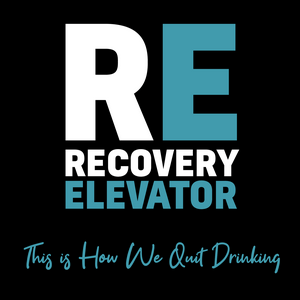Today we have Greg. He is 57 years old and from Midlothian, VA. He took his last drink on December 8th, 2025.
This episode is brought to you by:
Sign up and get 10% off: Better Help
Café RE – the social app for sober people
Recovery Elevator is compiling a list of recovery stories and we're going to put them in a book called This is How We Quit. If you want to be part of this book, please submit your story. There is no sobriety time requirement. Send an email to
[email protected] and you'll get a google form to fill out and submit your story.
If you have been thinking about joining Café RE, now is the time. The monthly price is increasing to $29 per month on March 1st. If you're already a member, your price will not increase, this is only for new membership. Keep in mind that $29 per month is most likely a fraction of what you may have spent on alcohol per month.
[03:55] Thoughts from Paul:
Paul shares with us a beautifully written piece someone shared with him a few months ago.
In summary, they didn't quit drinking after a dramatic rock bottom, but after a quiet realization. Alcohol had become an automatic habit used to avoid feelings, slowly eroding sleep , mood, health, clarity, and self-respect. "Functioning" wasn't truly living. When they stopped lying to themselves about its cost and stopped romanticizing it, drinking felt pointless—and they simply chose honesty over pretending.
[10:12] Paul introduces Greg:
Greg is 57 years old from Midlothian, VA. For work, Greg is self-employed and does lawn, landscape and maintenance work. He has been married for 24 years, and he has four adult children, one grandchild, two dogs and a cat. For fun, Greg enjoys going to yard sales, is a big sports fan and enjoys music of all kinds.
Greg rarely drank in high school but began drinking regularly in college, which hurt his grades. After his GPA fell below 2.0, his father refused to keep paying for school unless he transferred to a Christian university. Greg initially moved out and continued partying while working a minimum-wage job but eventually accepted his father's offer. Despite strict no-drinking rules at the new school, he found ways to keep partying.
With his first child on the way after graduation, Greg got a position working in retail management. A few years later he shifted to working in the restaurant business, which found him drinking every evening after work and staying at the bar through all hours.
After his sister's sudden death, Greg's drinking intensified and shifted from social partying to drinking alone as a way to cope. He didn't see himself as an alcoholic - it just felt normal to him. When his relationship with the mother of his first two children ended, his drinking continued to worsen.
Within a few years, Greg and his current wife married and had two kids together. Greg continued to drink daily and over the years, his wife's tolerance decreased. She tried everything she could to help him stop, but eventually she began talking about divorce and separation, but he didn't believe she would do it.
In March 2025, his wife moved out. Greg had made a statement that this was just who he was, and he was done trying to quit drinking and he now believes that was the straw that broke the camel's back. He still had no interest in quitting drinking until August 2025 when he heard a voice telling him to start going back to church.
This was the catalyst Greg needed, and he surrendered control of his life to Jesus Christ and became active in his church community. He starts his mornings with reading the bible, journalling and reviewing his thoughts and feelings. He is currently starting a recovery group at his church. Greg and his wife are working on reconciliation. Now 45 days away from alcohol at the time of recording, Greg feels like a completely different person.
Recovery Elevator
This isn't a no to alcohol,
But a hell yes to a better life
I love you guys,
RE Instagram
Sobriety Tracker iTunes
RE YouTube


